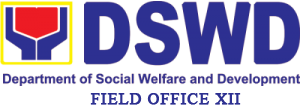Koronadal City—The dangerous daily struggle of children in going to school by crossing the Pangi River in Kiamba town, Sarangani province has finally come to an end.
The long-awaited hanging cable bridge of remote village of Tablao in the southwestern part of town has been completed and turned over recently to the community through the DSWD’s flagship empowerment and poverty-reduction program, Kalahi-CIDSS.
Bai Zorahayda T. Taha, DSWD 12 regional director said that the bridge is considered to be one of the most important projects built, benefiting all the residents in the village.
“The bridge project means life to the villagers because it literally saves their lives, especially the school children whose lives are at risk every time they cross the river,” Taha said.
The government has spent P3.58 million pesos through the collaborative efforts of the agency, local government of Kiamba and Tablao, with their local cash and in-kind counterpart, Taha added.
Mylene Damgasen, a volunteer who heads project management committee said that the completed project has changed the lives of the residents in village.
According to Damgasen, teachers had to send Tablao students back home before the river is swollen due to heavy rains.
Farmers, too, needed to take the Maitum road, a neighboring town, just to transport their products to their homes and avoid risking their lives in the process, especially during heavy rains, Damgasen said.
Kiamba Mayor Raul C. Martinez expressed gratitude to the local villagers for their active involvement in the realization of bridge project, which is considered to be the longest hanging bridge existing in town with a length of 60 linear meters.
“This is a demand-driven project and this is the result if our local leaders and residents demand their needs to the government, it is answered through collaborative efforts, Martinez said.
Kalahi-CIDSS, which stands for Kapit-Bisig Laban sa Kahirapan-A Comprehensive and Integrated Delivery of Social Services, is a national community-driven development program of DSWD funded by World Bank.
The program aims to bring together different stakeholders so that grassroots communities work cohesively and transparently to move toward progress, leaving no one behind in terms of development. (Hilbert T. Estacion, regional social marketing officer, DSWD 12)
